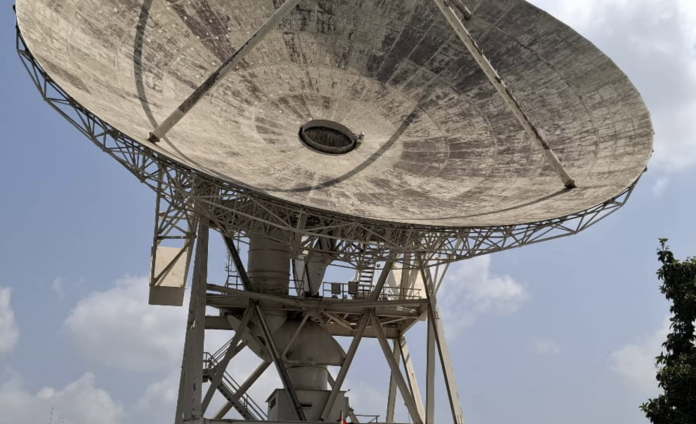
Audio By Carbonatix
The Ghana Atomic Energy Commission (GAEC) has expressed concerns over the illegal acquisition of lands surrounding the Ghana Radio Astronomy Observatory (GRAO) at Kuntunse, Ga West Municipality, Greater Accra Region.
The land, acquired over 40 years ago to support satellite observation, data collection, research, and training in Space Sciences, has been taken over by private developers, which is now impacting the efficiency of the facility.
Addressing a news conference following a tour of the Observatory on Tuesday, the management of the GRAO raised alarm over ongoing construction near the facility, warning that the observatory could become “useless” if those activities continued.
The management explained that settlements and household devices, such as microwaves, were interfering with radio signals, hampering satellite observations beyond 10 minutes.
Launched in 2017, GRAO plays a crucial role in global space science, offering a platform for scientists to study the universe.
It supports Ghana’s participation in space research, fostering the development of scientists and engineers.
Ghana’s National Space Science Policy, launched in 2024, aims to leverage space technology for national development, security, and sustainability.
During a visit to the Observatory on Tuesday afternoon, the Ghana News Agency observed that numerous buildings had been constructed around the facility, with some located as close as 50 meters from the satellite dish.
Military officers were stationed at the site, providing security while contractors worked diligently to construct a fence around the remaining buffer zones of the facility.
Obrempong Toku Dum (VIII), Project Manager of the Via Sat Station (Real Time Earth Station), revealed that in 1979, an Executive Instrument facilitated the procurement of 163 hectares of land for the Radio Astronomy Observatory.
However, he noted that the land had been reduced to about 30 hectares over the past four decades, which now threatened the future viability of the facility.
“We want to create awareness about the importance of this facility. Ghana’s closeness to the equator presents an opportunity for us to attract investment into this facility,” Obrempong Dum VIII said.
Dr Joseph Bremang Tandoh, Director, Ghana Space Science Technology Institute, said the Radio Astronomy Observatory was a vital national asset crucial for the successful implementation of Ghana’s Space Science Policy.
He appealed to authorities and the public to support efforts to protect the facility from further encroachment and safeguard the investments channelled into it.
“Through this facility, a lot of Ghanaians have been trained in data science and other professions, and this inspires the next generation to pursue science. We have to protect it,” he said.
Latest Stories
-
Britney Spears sells rights to entire music catalogue
59 minutes -
Ex-police chief said Trump told him in 2006 ‘everyone’ knew of Epstein’s behaviour
1 hour -
Pilot praised after crash-landing faulty Somali passenger plane on seashore
1 hour -
Haaland puts ‘pressure on himself’ to help team
2 hours -
Snoop Dogg to attend Swansea game for first time
2 hours -
Toughest season I’ve had as manager ‘by a mile’ – Slot
2 hours -
CSOs have lost their moral voice – John Awuah tears into galamsey ‘noise’
5 hours -
Suspend it now – University non-teaching unions reject GTEC retirement directive, warn of disruption
5 hours -
Galamsey is killing Ghana, but civil society is distracted – John Awuah
6 hours -
Rayan scores again as Bournemouth fight back to beat Everton
6 hours -
Leeds snatch draw as Chelsea throw away two-goal lead
6 hours -
Thomas Frank insists he is safe – but will he avoid Spurs sack?
6 hours -
‘No win, no trim’ – has a haircut become a problem for Man Utd?
7 hours -
Carrick’s ‘Sir Alex’ playbook and a happy start at Man Utd
7 hours -
Dambai police barrier intercept truck suspected of smuggling marijuana
7 hours

